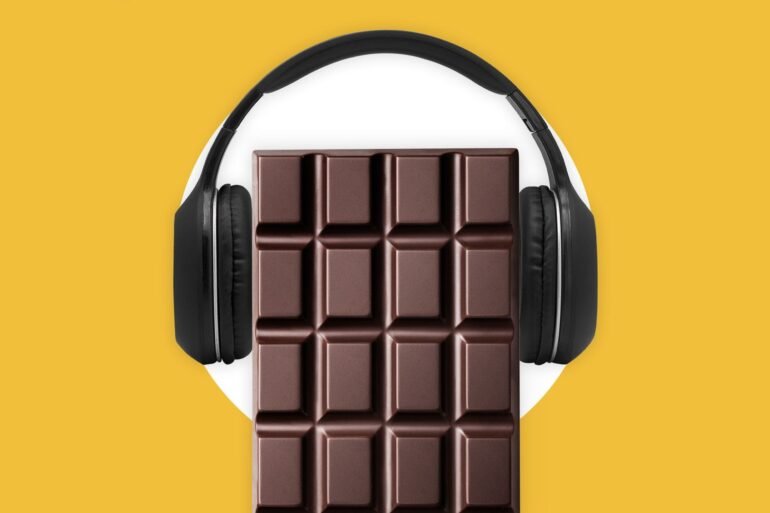:max_bytes(150000):strip_icc():format(jpeg)/Can-Sound-Influence-Flavor-FT-BLOG0925-f6d4a9d96aca4ede89231dc5961fb6c5.jpg)
- Scientists are investigating how music can enhance taste, with new research indicating that certain sounds can make chocolate and other foods taste sweeter or smoother.
- Composer and sensory researcher Natalie Hyacinth created a song to enhance Galaxy chocolate’s flavor, using a piano and harp at a tempo matching its melting speed.
- Oxford professor Charles Spence’s research on “sonic seasoning” demonstrates that background noise and pitch can influence flavor perception, including why foods taste different on airplanes.
Eating is already a multi-sensory experience. The sight, smell, and taste of the food all work together to create the perfect harmony. However, scientists say there’s one more way to enhance this concert, and that’s by adding the right music.
In August, Dr. Natalie Hyacinth, a composer and sensory researcher at the University of Bristol, released a 90-second song titled “Sweestest Melody,” a track commissioned by Galaxy Chocolate to make its sweets taste even better.
Hyacinth, who studies multisensory integration, created the song after a poll of 2,000 British people showed that 37% said their favorite way to enjoy “me time” is with a sweet treat, while 56% said they also listen to music to relax. So, the researcher decided to combine the two experiences to improve both
To compose the music, Hyacinth reviewed six decades of research to understand which pitch, tempo, and key affect taste, particularly for sweet things, to enhance the experience. The resulting song is a mix of piano (which she explains in a YouTube video is used to add sweetness) and harp (to add smoothness), set to 78 beats per minute, which also happens to be the same time it takes for a piece of Galaxy chocolate to melt.
“This initiative shows how enjoying chocolate can be a multisensory experience that goes beyond taste to engage all senses,” she told The Mirror. “The power of music to enhance our enjoyment of chocolate is a thrilling prospect.”
However, this is not the only work demonstrating the influence of sound on food. In 2023, Food & Wine covered the research of Professor Charles Spence, the head of the Crossmodal Research Laboratory at Oxford University, and his ideas on “sonic seasoning.”
“Flying a lot for work got me thinking — why focus only on restaurants [and dining] on the ground,” Spence shared at the time. “That then led into the observation that there are a whole lot of people who order Bloody Marys [and] tomato juice in the air who would never think of doing so on the ground.”
So, he studied the phenomenon and found that the dry air in an airplane cabin, the change in air pressure, and the hum of the engine affect how we taste.
“It turns out that the 80-85 DB of the engine noise while flying negatively impacts our ability to taste sweet and salty — hence why airline meals need so much more salt and sugar — to make the taste the same as they would on the ground,” Spence said.
As for how to make things taste great while in the air, Spence explained it’s easy: get noise-canceling headphones and pick a track you really enjoy. “Given that the more you like the music, generally speaking, the more you like food,” he said. He, like Hyacinth, found that “high-pitched sounds bring out the sweetness and lower the pitch of the music to bring out those bitter notes.” Though really, your favorite song should enhance a meal just the same.
Stacey Leasca
2025-09-25 12:01:00

